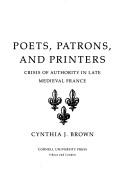| Listing 1 - 1 of 1 |
Sort by
|

ISBN: 0801430712 150174254X 1501742531 Year: 1995 Publisher: Ithaca, NY London Cornell University Press
Abstract | Keywords | Export | Availability | Bookmark
 Loading...
Loading...Choose an application
- Reference Manager
- EndNote
- RefWorks (Direct export to RefWorks)
Cynthia J. Brown explains why the advent of print in the late medieval period brought about changes in relationships among poets, patrons, and printers which led to a new conception of authorship.Examining such paratextual elements of manuscripts as title pages, colophons, and illustrations as well as such literary strategies as experimentation with narrative voice, Brown traces authors' attempts to underscore their narrative presence in their works and to displace patrons from their role as sponsors and protectors of the book. Her accounts of the struggles of poets, including Jean Lemaire, Jean Bouchet, Jean Molinet, and Pierre Gringore, over the design, printing, and sale of their books demonstrate how authors secured the status of literary proprietor during the transition from the culture of script and courtly patronage to that of print capitalism.
Poetry
---
Book history
---
Industrial and intellectual property
---
French literature
---
anno 1500-1599
---
France
---
Authors and publishers
---
Authorship
---
Copyright
---
Literature publishing
---
Renaissance
---
History
---
091 <44>
---
094.1 <44>
---
840-1 "14/15"
---
930.85.42 <44>
---
-Authorship
---
-Copyright
---
-Renaissance
---
-Literature publishing
---
-Literary publishing
---
Literature
---
Publishers and publishing
---
Revival of letters
---
Civilization
---
History, Modern
---
Civilization, Medieval
---
Civilization, Modern
---
Humanism
---
Middle Ages
---
Literary property
---
Property, Literary
---
Intangible property
---
Intellectual property
---
Anti-copyright movement
---
Book registration, National
---
Patent laws and legislation
---
Authoring (Authorship)
---
Writing (Authorship)
---
Author and publisher
---
Publishers and authors
---
Publishing contracts
---
Contracts
---
Book proposals
---
Literary agents
---
Handschriftenkunde. Handschriftencatalogi--Frankrijk
---
Oude drukken: bibliografie--
| Listing 1 - 1 of 1 |
Sort by
|

 Search
Search Feedback
Feedback About UniCat
About UniCat  Help
Help News
News